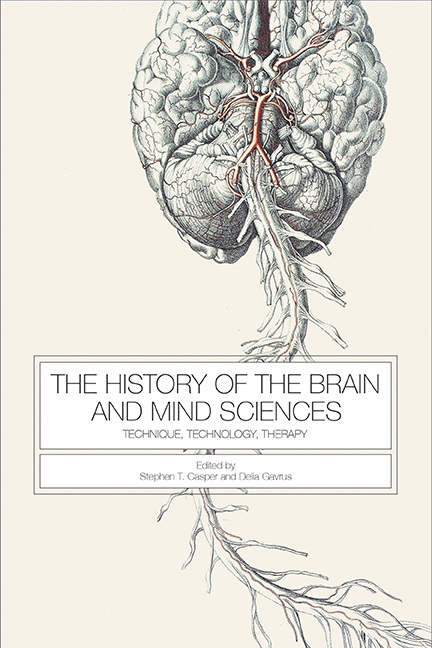Book contents
- Frontmatter
- Contents
- Acknowledgments
- Introduction
- 1 “We Are Veritable Animals”: The Nineteenth-Century Paris Menagerie as a Site for the Science of Intelligence
- 2 “Physiological Surgery”: Laboratory Science as the Epistemic Basis of Modern Surgery (and Neurosurgery)
- 3 Configuring Epidemic Encephalitis as a National and International Neurological Concern
- 4 Circuits, Algae, and Whipped Cream: The Biophysics of Nerve, ca. 1930
- 5 Epilepsy and the Laboratory Technician: Technique in Histology and Fiction
- 6 “What Was in Their Luggage?”: German Refugee Neuroscientists, Migrating Technologies, and the Emergence of Interdisciplinary Research Networks in North America, 1933 to 1963
- 7 Dualist Techniques for Materialist Imaginaries: Matter and Mind in the 1951 Festival of Britain
- 8 A “Model Schizophrenia”: Amphetamine Psychosis and the Transformation of American Psychiatry
- 9 Salvation through Reductionism: The National Institute of Mental Health and the Return to Biological Psychiatry
- Coda: Technique, Marginality, and History
- Bibliography
- List of Contributors
- Index
1 - “We Are Veritable Animals”: The Nineteenth-Century Paris Menagerie as a Site for the Science of Intelligence
Published online by Cambridge University Press: 26 May 2021
- Frontmatter
- Contents
- Acknowledgments
- Introduction
- 1 “We Are Veritable Animals”: The Nineteenth-Century Paris Menagerie as a Site for the Science of Intelligence
- 2 “Physiological Surgery”: Laboratory Science as the Epistemic Basis of Modern Surgery (and Neurosurgery)
- 3 Configuring Epidemic Encephalitis as a National and International Neurological Concern
- 4 Circuits, Algae, and Whipped Cream: The Biophysics of Nerve, ca. 1930
- 5 Epilepsy and the Laboratory Technician: Technique in Histology and Fiction
- 6 “What Was in Their Luggage?”: German Refugee Neuroscientists, Migrating Technologies, and the Emergence of Interdisciplinary Research Networks in North America, 1933 to 1963
- 7 Dualist Techniques for Materialist Imaginaries: Matter and Mind in the 1951 Festival of Britain
- 8 A “Model Schizophrenia”: Amphetamine Psychosis and the Transformation of American Psychiatry
- 9 Salvation through Reductionism: The National Institute of Mental Health and the Return to Biological Psychiatry
- Coda: Technique, Marginality, and History
- Bibliography
- List of Contributors
- Index
Summary
Introduction
In his paper “The Mental Hospital and the Zoological Garden” (1965), the psychiatrist and historian Henry E. Ellenberger drew a provocative parallel between the histories of these two institutions. He pointed out a chronological synchronicity in the emergence of the appearance of a recognizable modern version of the asylum and the zoo: both were products of the era of the French Revolution and its aftermath. There was even a certain overlap in the personnel who oversaw these developments. Philippe Pinel (1745–1826), best known as an alienist famed for striking off the chains of the inmates at Bicêtre, was a member of the commission that in 1792 drew up a blueprint for a new Menagerie in the Jardin des Plantes in Paris.
Ellenberger, moreover, discerned a certain structural homology between the asylum and the zoo. One shared feature was a category that Ellenberger designates “Authorities.” In the case of the asylum, these Authorities were the alienists who provided medical direction of the establishment. In the Paris Menagerie, the zoologist possessed a comparable status. Corresponding to the asylum patients were the animals housed in the Menagerie. Both may be seen as subject to—perhaps even constituted by—the gaze of the presiding Authority. The asylum and menagerie also shared a third, often overlooked yet significant, category: the lay staff who were responsible for the daily running of these institutions. The care and control of asylum patients was largely delegated to attendants drawn from a variety of backgrounds but with little or any in the way of specialist training. Still less is known about the keepers who performed a similar indispensable role in the menagerie, seeing to the daily needs of the animals.
Ellenberger also parenthetically notes that in respect of the role of the public there is, however, a divergence. While the public was largely excluded from the nineteenth-century asylum—in contrast to the voyeurism of earlier epochs—part of the rationale for the reformed post-revolutionary Menagerie was that it should be open to the citizenry. Such a populist ethos was in explicit contrast to the elitism of the old royal menagerie at Versailles.
- Type
- Chapter
- Information
- The History of the Brain and Mind SciencesTechnique, Technology, Therapy, pp. 25 - 47Publisher: Boydell & BrewerPrint publication year: 2017



